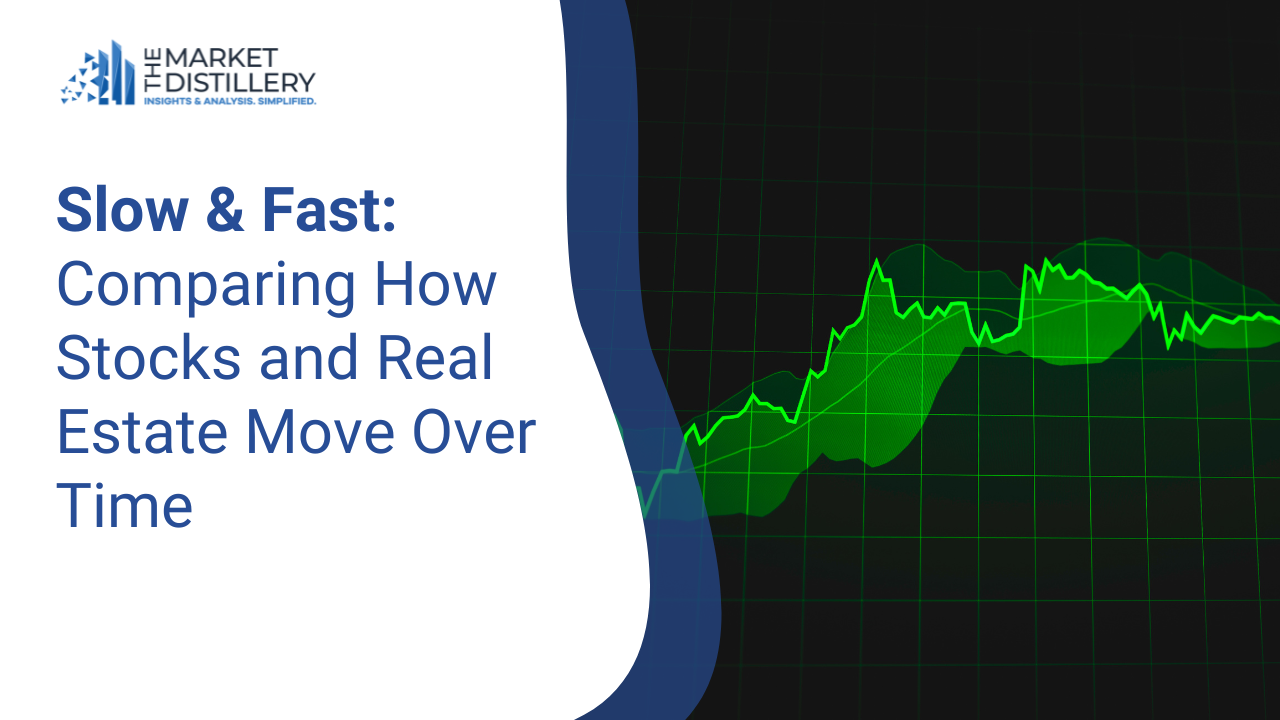Slow & Fast: Comparing How Stocks and Real Estate Move Over Time
Apr 13, 2025
Real estate = smoother ride 😎
We've gone through quite the rollercoaster lately.
Tariffs, interest rates, the stock market, and perhaps toddlers (or maybe just mine 😉) all have us seeking our happy place.
In less than 2 months, the S&P 500 has declined over 17%.
Two weeks ago, stocks were down a whopping 9% over the week.
Plenty of people were reaching for their paper bags to keep from hyperventilating.
This past week, we coped a little better as stocks finished up slightly over 5%.
Do you or your clients own stocks? 🤑
All of this matters because roughly 61% of Americans own stocks according to the most recent Gallup poll.
Look a little closer and you'll see it goes up to 84% if the household income is over $100,000 - aka prime homebuyers.
Further, if the stock market takes a tumble, it can echo into the real estate market as buyers lose their confidence to make a big purchase (like a house) or potentially the source of their down payment.
Worst of all, it can be easy to let fear from the stock market cause you to believe real estate could decline in a similar manner.
With that in mind, let's get some clarity and take a look at how these two asset classes have changed since 2020:

Stocks move wildly compared to real estate. 🎢
If you're seeking adrenaline, the stock market delivers.
The chart above compares how stocks (orange line) and real estate values in America (blue line) changed over time.
You can see we get wild moves up and down in the stock market while real estate moves along gently.
One of the big reasons stocks swing wildly is because roughly 10,997,674,548 shares are traded every business day. You can buy and sell in a literal blink of an eye.
Compare that to the 18,956 homes sold in America each business day in 2024.
And oh by the way, it generally takes 30 days to complete a home sale.

Both are valuable. They're just different. 💡
This isn't an argument for or against stocks or real estate. Rather, it's pointing out one of the major differences: their volatility (how quickly and much they each change).
Understanding how the two assets behave helps you manage your (and your clients') expectations when it comes to investing.
Further, we should all strive to take a longer point-of-view on owning both stocks and real estate.
Don't think about what your investments will do over the next day, month, or year.
Make decisions based on a 3-, 5-, or 10-year timeframe if you want to make better investments and skip the whiplash.
Remember, if you bought a property at the peak in 2006 and lived in the home 10 years, you likely avoided the value declines of 2008 completely.
In real estate, a longer ownership timeframe reduces risk of losing value significantly.
Change your perspective, change your results! 🚀
![]()
Dr. Alex Stewart
Founder
Realtors: want to be confident discussing the market? 🚀
If you're like so many of the Realtors I meet, you know understanding the local market is one of the most important things you can do as a real estate agent.
Everyone asks "how's the market?" when you meet them and the way you respond either opens a door of opportunity or shuts it.
Most Realtors have the stats but don't know what to do with them. There's so much going on that it gets confusing quickly.
If this sounds like you, My Market Insiders coaching could be just what you need. It's part local market updates, part business strategy so that you can be clear about exactly what's happening in the market and how to use that expertise to attract your ideal clients.
Members rate it 9.8 out of 10 for value to their business and increase their confidence talking about the market by 24%.
Click the button below to learn more about the program and if it's right for you ⤵️

